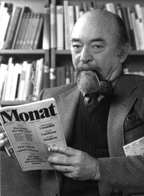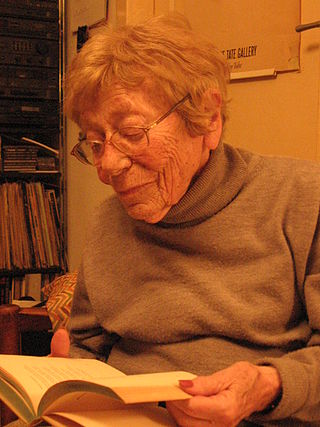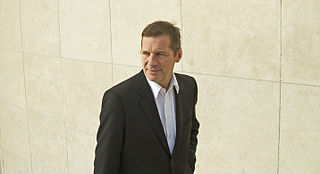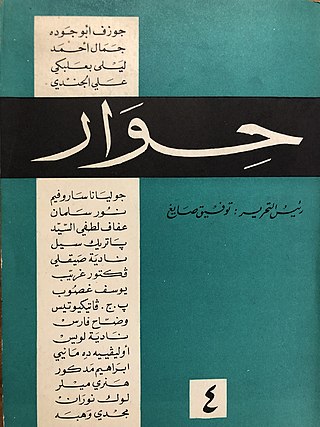Günther Nenning was an Austrian journalist, author, and political activist.
The Congress for Cultural Freedom (CCF) was an anti-communist cultural organization founded on 26 June 1950 in West Berlin. At its height, the CCF was active in thirty-five countries. In 1966 it was revealed that the Central Intelligence Agency was instrumental in the establishment and funding of the group. The congress aimed to enlist intellectuals and opinion makers in a war of ideas against communism.

Alexander Lernet-Holenia was an Austrian poet, novelist, dramaturgist and writer of screenplays and historical studies who produced a heterogeneous literary opus that included poetry, psychological novels describing the intrusion of otherworldly or unreal experiences into reality, and recreational films. He was born and died in Vienna.
Austrian literature is mostly written in German, and is closely connected with German literature.

Melvin Jonah Lasky was an American journalist, intellectual, and member of the anti-Communist left. He founded the German journal Der Monat in 1948 and, from 1958 to 1991, edited Encounter, one of many journals revealed to have been secretly funded by the CIA through the Congress for Cultural Freedom (CCF).
The American Committee for Cultural Freedom (ACCF) was the U.S. affiliate of the anti-Communist Congress for Cultural Freedom (CCF).
Mundo Nuevo was an influential Spanish-language periodical, being a monthly revista de cultura dedicated to new Latin American literature. Sponsored by the Ford Foundation, the magazine was founded by Emir Rodríguez Monegal in Paris, France, in 1966 and distributed worldwide. Monegal edited it until 1968 and resigned after a five-part installation in the New York Times that revealed the Congress for Cultural Freedom, a source of funding for the magazine, was a front for the CIA. In fact, it was started as a successor of another Spanish language magazine of the Congress, namely Cuadernos. Mundo Nuevo stopped in 1971 after 58 issues.

Freda Meissner-Blau was an Austrian politician, activist, and prominent figurehead in the Austrian environmental movement. She was a founder and the federal spokesperson of the Austrian Green Party.

Ilse Maria Aschner, née Römer, was an Austrian journalist and survivor of the Holocaust.

The Cultural Cold War was a set of propaganda campaigns waged by the United States and the Soviet Union during the Cold War, with each country promoting their own culture, arts, literature, and music. In addition, less overtly, their opposing political choices and ideologies at the expense of the other. Many of the battles were fought in Europe or in European Universities, with Communist Party leaders depicting the United States as a cultural black hole while pointing to their own cultural heritage as proof that they were the inheritors of the European Enlightenment. The U.S. responded by accusing the Soviets of "disregarding the inherent value of culture," and subjugating art to the controlling policies of a totalitarian political system, even as they felt saddled with the responsibility of preserving and fostering western civilization's best cultural traditions, given the many European artists who took refuge in the United States before, during, and after World War II.
The Committee for Cultural Freedom (CCF) was an American political organization active from 1939 to 1951 which advocated opposition to the totalitarianism of both the Soviet Union and Nazi Germany in foreign affairs, and promoted pro-democratic reforms in public and private institutions domestically. Co-founded by influential philosopher and educator John Dewey and the anti-Soviet Marxist academic Sidney Hook, it was reorganized in January 1951 into the American Committee for Cultural Freedom.

Christian Michelides is an Austrian psychotherapist. He is the director of Lighthouse Wien.
Gerhard Fritz Oberschlick is an Austrian essayist. From 1985 to 1995 he was the editor of the political and cultural magazine FORVM. Today he serves as the literary executor of Günther Anders.
News is an Austrian weekly news magazine published in German and based in Vienna, Austria. The weekly is the major news magazine in the country and has been in circulation since October 1992.

Hiwar was an Arabic magazine published in Beirut between 1962 and 1967. The magazine was established and financed by the CIA during the cultural Cold War, under the cover of a front organization, the Congress for Cultural Freedom.
Cuadernos was a Spanish-language magazine that was published in Paris, France, in the period 1953–1965. Its full title was Cuadernos del Congreso por la Libertad de la Cultura. It was one of the publications of the Congress for Cultural Freedom.
Tempo Presente was a monthly political magazine which existed between 1956 and 1967 in Rome, Italy. It was supported by the Congress for Cultural Freedom which published other magazines, including Cuadernos, Encounter, Survey and Der Monat.
Tilanne was a monthly leftist magazine published in Helsinki, Finland, in the period between 1961 and 1967. It was one of the magazines funded by the CIA through the Congress for Cultural Freedom (CCF) during the cultural Cold War.

As part of an anti-communist campaign in Austria against the author Bertolt Brecht, his work was boycotted for ten years. Between 1953 and 1963, no established Viennese theater performed his works. The initiators were the publicists Hans Weigel and Friedrich Torberg as well as the Burgtheater director Ernst Haeussermann.








